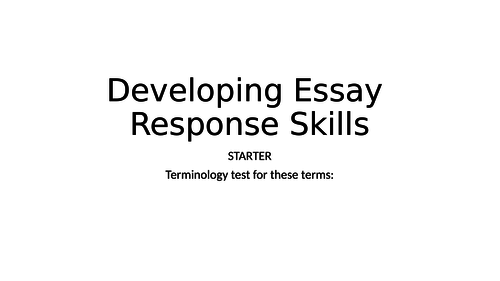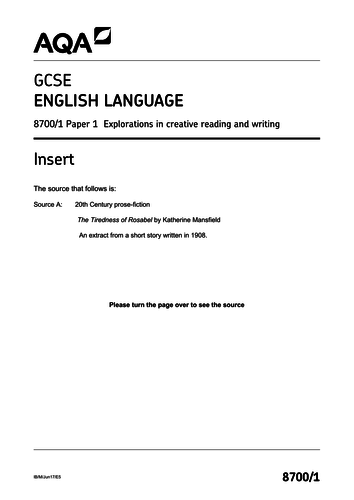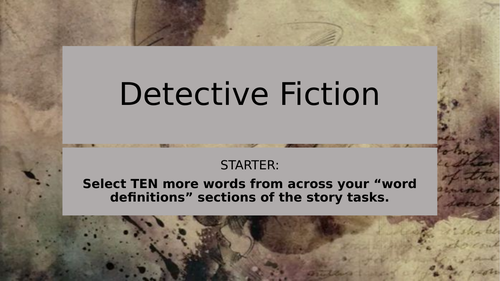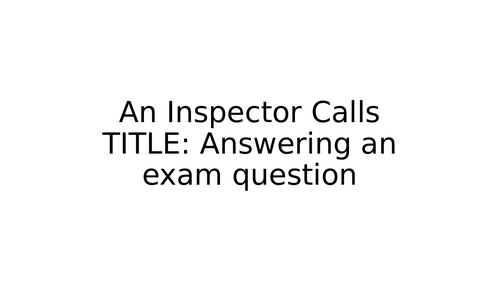
228Uploads
563k+Views
1397k+Downloads
English

AQA English Language Paper 1 Resources - based upon 100% Perfect Girl
A few things first: the mock exam can be found elsewhere on in my resources and I base the lessons off a similar series of lessons focused on Anil. The difference here is that these lessons are very much targeting higher ability students - all of the success criteria draws from the top end of the mark criteria.
I found this series of lessons to be really useful as a way of establishing the skills required to answer each of the Section A questions. The lessons focus less on exam strategy and more on understanding what is required in relation to each question. The kids found it useful.

AQA English Literature Power and Conflict Poetry: Random Comparative Question Generator
Does exactly what it says. This spreadsheet will create one random comparative question for and will generate a new one every time you double-click a cell and press enter. A word of caution in that you cannot retrieve the old question. But, this is very useful for revision and or cover lessons.
I’ve left room for you to add in your own question stems and you can manipulate the poetry lists too. I’ve left some instructions on the relevant tab.
Hope you find this useful.

Punctuation vs Teachers: Tracking punctuation skill progress and making it fun(ish...)
A series of activities that are designed to be taught over time. There is a bit of initial leg-work to do in setting up the spreadsheet and, truth be told, I’ve had more success using this with smaller classes than with larger ones - the volume of specific data generated gets unwieldy with the larger groups.
So, I’ve divided punctuation up into three groups - BASIC, MID-RANGE and ADVANCED. The idea is that you teach/go over/re-demonstrate the type a type of punctuation. Then, the students are given ten minutes to write where they focus on using that type of punctuation. Each punctuation type has a points value, and the goal is to “defeat” a possessed teacher by using that type of punctuation. The powerpoint presentations each show a teacher (or a combination of teachers) making their way across the screen over the course of ten minutes. There’s the option of spooky orchestral music too.
There are specific work sheets that each student will need - each work sheet contains the points value of each punctuation type and a grid where you can wither self/peer/teacher assess depending on how you want to set the lesson up.
As the class progresses, so to does the complexity of the task. Each new level incorporates a new type of punctuation OR (more importantly) a new combination of focuses. For example, level 3 requires students to use BASIC and MID-RANGE punctuation to defeat two teachers.
What I found useful was the specific nature of the feedback I got: I could see quite clearly which punctuation types were defeating each student and which punctuation type was an issue for the class as a whole. And, if the class lost (which they did on more than one occasion) then they retried the level the following week.
We used this in SPAG lessons in combination with some other elements - it can easily be made into a whole lesson.
A useful little tool…

AQA English Language and Literature: Developing essay response skills to the Paris Anthology section
This is my attempt to engage and develop my Year 12s academic voices in their Paris Anthology related essay responses. The main issue my class had seemed to focus upon when and where to start. What I do is show them how they can place a particular emphasis on one of several potential areas of focus initially. I show them how they could use Mode, Audience, Purpose, each of Grice’s Maxims and each of the different levels of language as a starting point for an analytical response. The attached word document appears to be an “essay”.It isn’t. It’s the collected starting points placed in one document so that the students can focus more on the “how you do it” instead of trying to copy down the best bits.
It worked reasonably well and is suited for a class with similar needs. Hope you find this useful.

AQA English Language PAPER 1 Creative Writing Tasks/Resources
Three slides on a power point that can easily be printed out and handed out as a task. Each slide gets progressively more complex. Each slide contains a choice of two tasks (one descriptive and one relating to the writing of a narrative), a punctuation related challenge, a content challenge and an organisational challenge.
Ran it with my year 11s yesterday and they found it very useful.
Oh yes! I have intentionally put one spelling/punctuation mistake on each slide with the idea that I award a housepoint to the first student that identified it. You’re welcome!

AQA English Literature - A Christmas Carol: Complete Unit of Work
The lessons are designed to tie in specifically with the Scholastic Classics version of the text OR the Collins Classroom Classics version, but it wouldn’t take too much to use this with any version to be honest.
Visually, the powerpoints are designed to be eye-catching. Each one is loaded with links to videos, layered with animations and suitably spooky xmas music.
The lessons are ordered via number for your convenience. There is a specific focus on each of the GCSE Assessment Focuses, starting with AO3 (It makes sense, to me at least, to contextualise the story prior to reading it).
The stave lessons each contain definitions of the archaic words (though there is a definite backing off with this the further in you get: as the students get more familiar with the language, they’ll need less prompting with decoding it), as well as a particular focus on key quotations. There are comprehension questions layered throughout, and the first THREE of the stave lessons have an ending task that links to a type of question found in AQA English Language Paper 1 Section A - my class had previously focused on this unit and it made sense to me to keep these skills “hot” so to speak.
The AO specific lessons tie in with the Assessment Objectives for the English Literature course. The AO1 and AO2 lessons assume that the students have read the entire text.
Finally, the theme lessons build towards the students sitting a GCSE Literature style assessment.
I have sourced a lot of ideas from the following pdf file - I wouldn’t feel comfortable trying to pass these ideas off as my own; I include the link so that any person might have the benefit of this resource without having to pay for mine:
http://drbacchus.com/files/christmas_carol/glossary.pdf
There’s about 30+ hours worth of teaching materials in here; enjoy!
Bundle

AQA GCSE Curriculum
Every scheme of work that I’ve made that could be used to teach AQA English Language and AQA English Literature

AQA English Language Paper 1: The Tiredness of Rosabel exam deconstruction
A lesson designed to be taught AFTER the class has sat a mock exam. However, with very little modifcation this can become a walking-talking mock exam, or a peer/self assessment based lesson.
The powerpoint contains model material and an indicator as to the quality of the model material. My class found this lesson to be very useful.
Additionally, the insert is available for free should you wish to download it for yourself. I include the link below:
https://linwood.bournemouth.sch.uk/summerwood/files/2017/12/8700_1-INS-EnglishLanguage-G-6Jun17-AM.pdf

AQA English Language and Literature A-Level: Foregrounding Heaney
A few elements of my class really struggled with this concept. So, I’ve broken it down into a step by step guide. The class will each need a copy of the AQA Poetry Anthology for this. It focuses on Follower first and then sets them up for an academic tilt at a comparative response.
I’ve had a good response from the elements of the class that initially struggled too.

KS3: Detective Fiction - Sherlock Holmes. Workbook included. Reading and Writing SoW.
A thoroughly enjoyable unit of work. Built around a work booklet and designed for that awkward half-term at the end of the year where you don’t want to give out new exercise books.
The workbook contains a copy of The Norwood Builder, comprehension questions and vocabulary list, as well as a variety of activities that focus (primarily) upon creative writing skills with some language and structure based tasks.
The lessons are designed to be used with the workbook.
NOTE: I may upload a slightly different workbook in the future, but I will leave the original on here.

AQA Power and Conflict BATTLE CARDS
As part of my quest to engage students with the 15 Power and Conflict poems, I’ve come up with these Battle Cards. Essentially, the idea is to promote AO1 and AO2 related discussions that get the students to recall what they know about the poems they have been taught without having the actual poem in front of them.
The students “score” each of the poem against a number of POWER and CONFLICT related areas. This is recorded on an A5 sized BATTLE CARD where they can draw supporting images(good for recall) and identify methods, key quotations and themes.
The idea is for students to battle one another and use the cards as the stimulus point for the discussion. Whoever is best able to justify the score they have given for their card wins the round.
I’ve included a blank card along with 15 poem specific cards (each of these has a supporting back ground image, but is the same as the blank card in all other respects).

AQA English Language Paper 2 Section A Resource pack: Jack the Ripper vs Zodiac Killer
A set of resources designed to engage year 11s with English Language Paper 2 Section A. I shaped the lessons around the articles written surrounding the time of Jack the Ripper, and around an article published following the Zodiac Killer sending a letter to the San Fransisco Chronicle.
The class were fascinated by these articles - I had students independently going away and reading pre-19th century newspapers off their own backs! This will need to be taught delicately though - the content is graphic in nature, so be sure that your class has the necessary level of maturity to access this material without being distracted.

AQA English Literature: Macbeth
A collection of resources designed to support the teaching of Macbeth at GCSE level. The lessons assume that the class will be “acting” out the play, using the summary as a stimulus for the acting out element. I interspersed this acting with numerous directions to read the text aloud; overall, the students enjoyed this combination of normal language and Shakespearean.
It has always been my way to establish an initial understanding of a Shakespearean text before trying to wade through the language.
Hopefully, this will prove a useful starting point.

AQA English Language Paper 1 MOCK EXAM: The Midnight Line (Jack Reacher)
I’ve used the opening chapter of the novel as the basis for an AQA Language Paper 1 mock exam. I’ve created an Answer paper too.

AQA English Literature: An Inspector Calls essay building lesson
A lesson that models the process of building a high-end An Inspector Calls essay. Please note, the lesson assumes that the class has read the play and has attempted versions of the AQA English Literature questions already. Also, the lesson works best as an aspirational example: I concentrate on using sophisticated language to shape my points, and focus on integrating appropriate references. Please note I’ve deliberately left some academic “gaps” too - this model response is a high-quality response, but there are other avenues of academic insight that can be taken.
Bottom line, to get the most out of this lesson, you’ll need to spend a little time going through it all first - hence the low price.

KS3: As You Like It - GCSE Focused SoW
To make effective use of this scheme I suggest you have a copy of the most recent RSC version of As You Like It (It is quite marvelous…) else a lot of the images I use will make little sense.
There are five “lessons” that each last around the two hour mark. Each of the assessments is available, so the whole package is a self-contained unit of work. We had a lot of fun with this unit, and I inter-spaced the learning with periods where the class would act out elements of the play.
You don’t necessarily need a copy of the play to teach this unit either.

KS3: Born a Crime - Structure Focus
A lesson take from a collaborative scheme of work. The lesson focuses on the quite excellent Born A Crime by Trevor Noah. The focus is developing an initial understanding of South Africa, then Trevor Noah himself, before focusing in on the context surrounding the story itself.
After, the focus switches to analysing the structural choices made in the extract.
Additionally, I’ve included a useful little follow up lesson where the focus ins to build a piece of creative writing that follows a specific structural path.


















